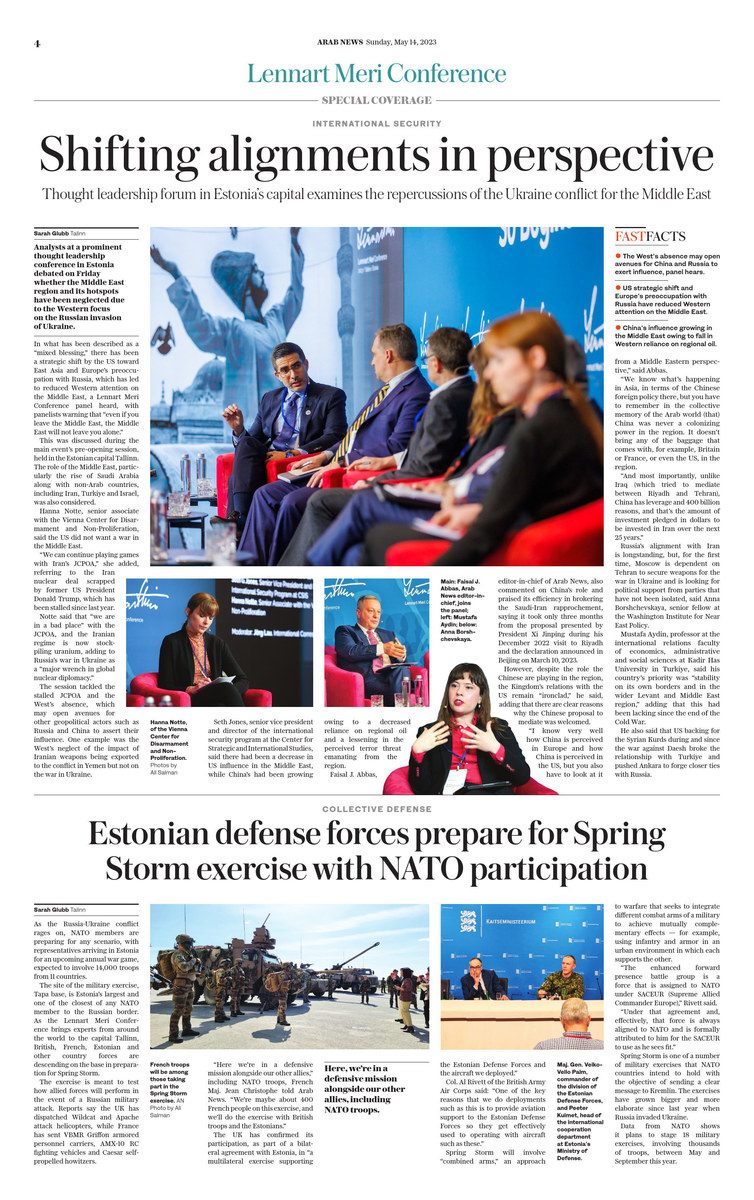TALLINN/LONDON: Experts agreed on Friday that the Russian invasion of Ukraine must lead to a Europe-wide rethink about how it approaches security and its transatlantic relationship with the US.
During a Lennart Meri Conference panel, academics and think-tank analysts joined Baltic prime ministers to discuss how the continent can best adapt and overcome ongoing economic and political crises in a unified manner.
According to the panel, the Russia-Ukraine conflict has posed the biggest test of European unity since the end of the Cold War, but also exposed the hollowness of its defensive capabilities and highlighted the need to bolster its defense industrial capacity.
Europe’s relationship with the US as a result of the conflict was also a key topic on the agenda.
The Prime Minister of Latvia Krisjanis Karins said the conflict in Ukraine and the growing influence of China had brought Europe and the US closer together, with Washington more engaged in European affairs than it was before.
He said: “I’ve spent a lot of time thinking about how we can make this relationship stronger, because I’m convinced from the European side it’s in our interest, but equally convinced it’s a big self-interest to the US side.
“We are all starting to come around to the realization that what we have is a full military dependence on the US through NATO; it’s there. The question is: What more can we do to make us a stronger partner for the US? Not to decouple, because we and the US face many challenges.”
Ingrida Simonyte, the prime minister of Lithuania, said the EU was, at its core, a peace project. She added that the conflict in Ukraine had forced the EU and its allies into considering the best ways to defend that hard-earned peace, even if through less-than-peaceful means.
She added: “I don’t want to say we have special (perspective) in the region; we just have a living memory of our past.
“Even for myself, I have (a memory) of 15 years of occupation of Lithuania by the Soviet Union and, for me, never again means never again. I just don’t want to see that happening again.”
Estonian Prime Minister Kaja Kallas said it was vital that Europe and the wider West worked together toward holding those responsible for Russian “crimes of aggression” accountable for their actions.
She said: “Russia must be held accountable. There can be no impunity, no immunity.
“A year ago, it was thought unimaginable that (Vladimir) Putin would be issued an arrest warrant by the ICC (International Criminal Court). Just six months ago, most were not prepared to publicly support the idea of a special tribunal for crimes of aggression. Now we’re at the point of no return.”
Simonyte agreed, saying: “There will be no sustainable peace in Europe if Ukraine falls. Russia will regroup, rearm and come for someone next.
“To avoid this, Russia must be expelled from the territory of Ukraine, bear the costs of its recovery, and the perpetrators of war crimes must be brought to justice.”























